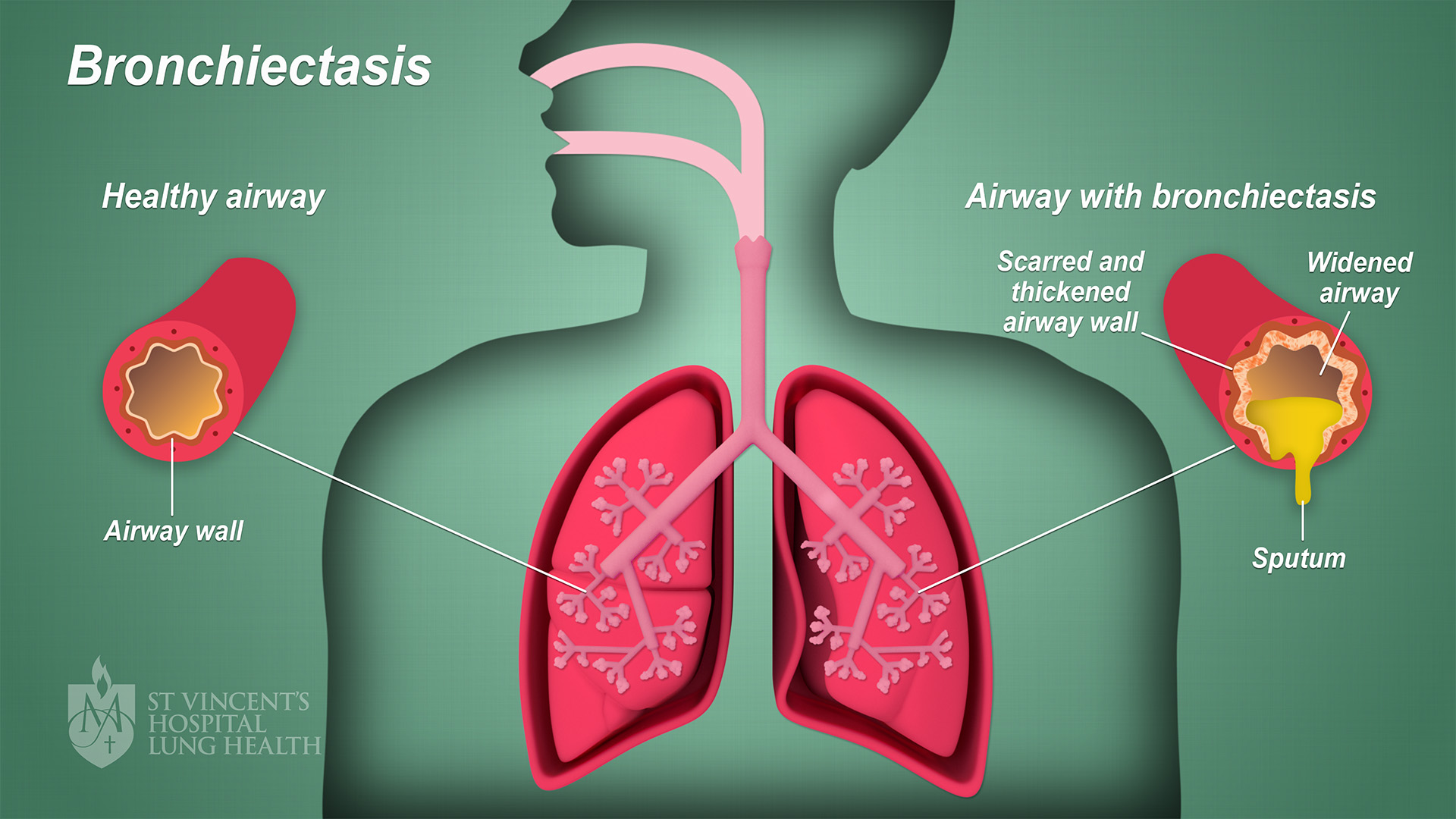Bronchiectasis
Bronchiectasis is a condition in which the airways become enlarged. Bronchiectasis is often linked with chronic infection.
What is bronchiectasis?
What are the causes of bronchiectasis?
What are the symptoms and signs of bronchiectasis?
What are the possible tests to diagnose bronchiectasis?
What are the possible treatments for bronchiectasis?
What is the future plan if you have bronchiectasis?
What is bronchiectasis?
Bronchiectasis is a condition in which the airways become enlarged. People with bronchiectasis may also have other health conditions.
One common factor in people with bronchiectasis is thought to be chronic infection and inflammation of the airways due to bacteria. A bacterial infection can cause the airways to get bigger and accumulate ‘pockets’ of mucus.
The image below illustrates bronchiectasis. (Click image to enlarge)

What are the causes of bronchiectasis?
Causes of bronchiectasis include:
- Allergy – an allergic reaction to fungi in people with asthma
- Drug use – as well as alcohol abuse
- Environmental exposure – exposure to toxic environmental agents
- GORD – also known as gastro-oesophageal reflux
- Infection – both viral and bacterial, including tuberculosis
- Smoking – especially cannabis.
Bronchiectasis can also be inherited due to:
In bronchiectasis, the smooth muscles and the elastic tissue that allow the airways to contract (get smaller) are damaged. Chronic infection causes further damage to the bronchial walls, in a vicious cycle. As the cycle of infection continues, the ability of the lungs to function normally decreases.
What are the symptoms and signs of bronchiectasis?
The most common symptom of bronchiectasis is a chronic cough that produces mucus (sputum). The cough may increase over time and be with or without a wheeze.
Other common symptoms of bronchiectasis include:
- Chronic sinus infection
- Fatigue
- Sinusitis (inflammation of the nasal and sinus passages).
Less common symptoms include:
- Chest pain
- Coughing up blood
- Shortness of breath
- Weight loss.
In many people, symptoms will get worse during certain time periods. These periods tend to be caused by illnesses like a head cold. In some cases, there is no clear reason why symptoms get worse.
What are the possible tests to diagnose bronchiectasis?
Bronchiectasis is diagnosed with a high-resolution CT scan of the lungs. The scan will show abnormal widening of the airways (bronchi). Testing a sample of sputum (mucus) can determine the type of bacteria causing the infection so your doctor knows the best antibiotic to give you.
Your doctor may order other tests to assess your immunity and resistance to infections. You should also have regular breathing tests to assess your lung function and monitor your progress.
What are the possible treatments for bronchiectasis?
Unfortunately, there is no cure for bronchiectasis other than a lung transplant. A transplant is usually only recommended in severe, life-threatening cases.
The main aims of treatment for bronchiectasis are to:
- Decrease the inflammation in the airways
- Prevent infections from getting worse
- Reduce mucus build up.
Treatment steps include:
- Avoiding factors that can make symptoms worse – such as cigarette smoke, alcohol and drugs
- Eating a healthy diet – a dietitian can help you develop a meal plan
- Ensuring immunisations are up-to-date – including yearly flu vaccinations and 5-yearly pneumonia vaccinations.
- Chest physiotherapy – to help with loosening mucus, including active breathing, huffing and coughing to help remove mucus build up
- Drinking plenty of water – increasing your fluid intake helps to reduce the thickness of mucus
- Exercising regularly – exercise can greatly benefit people with bronchiectasis
- Medications – antibiotic treatments as well as additional medications such as bronchodilators (helps to open airways), oxygen therapy and steroids in rare cases
- Surgery – usually only in severe cases.
It is important to seek early medical attention when you experience ‘flare-ups’ or become unwell from your symptoms. Delaying medical attention may result in a longer treatment and recovery period – as well as an increased severity of symptoms.
Below, you can watch a video about good nutrition for people with chronic lung conditions.
What is the future plan if you have bronchiectasis?
Despite bronchiectasis being a chronic condition, most people can control their symptoms with treatment and are able to live active, independent lives. A small number of people may develop severe symptoms or get worse quickly. These people may need more intense treatment and monitoring.
If you have any questions about your condition, or if you notice your symptoms getting worse over time, speak to your doctor.